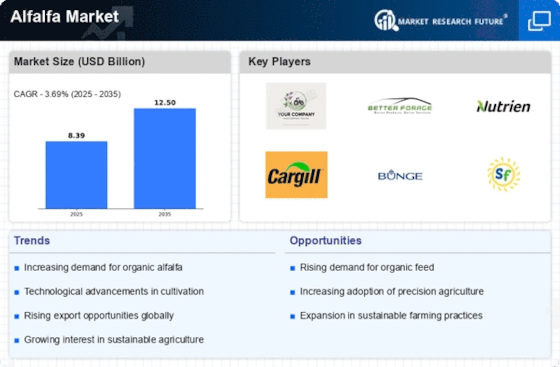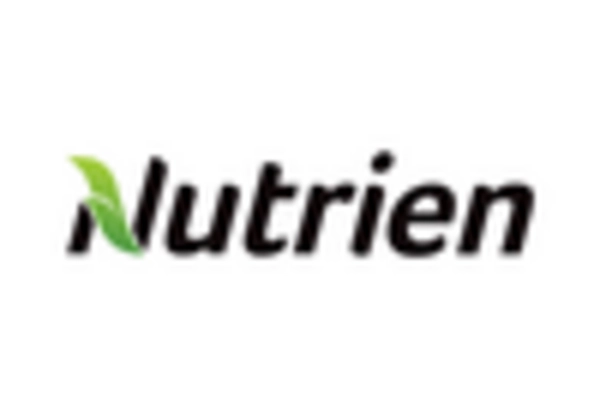- Alfalfa Market By Type (USD Billion, 2019-2035)
- Alfalfa Market By Application (USD Billion, 2019-2035)
- Animal Feed
- Human Food
- Nutraceuticals
- Cosmetics
- Alfalfa Market By End Use (USD Billion, 2019-2035)
- Dairy Farms
- Beef Farms
- Poultry Farms
- Aquaculture
- Alfalfa Market By Form (USD Billion, 2019-2035)
- Alfalfa Market By Regional (USD Billion, 2019-2035)
- North America
- Europe
- South America
- Asia Pacific
- Middle East and Africa
North America Outlook (USD Billion, 2019-2035)
North America Alfalfa Market by Type
Hay
Pellets
Meal
Extracts
North America Alfalfa Market by Application Type
Animal Feed
Human Food
Nutraceuticals
Cosmetics
North America Alfalfa Market by End Use Type
Dairy Farms
Beef Farms
Poultry Farms
Aquaculture
North America Alfalfa Market by Form Type
Whole Plant
Leaf
Seed
North America Alfalfa Market by Regional Type
US
Canada
US Outlook (USD Billion, 2019-2035)
US Alfalfa Market by Type
Hay
Pellets
Meal
Extracts
US Alfalfa Market by Application Type
Animal Feed
Human Food
Nutraceuticals
Cosmetics
US Alfalfa Market by End Use Type
Dairy Farms
Beef Farms
Poultry Farms
Aquaculture
US Alfalfa Market by Form Type
Whole Plant
Leaf
Seed
CANADA Outlook (USD Billion, 2019-2035)
CANADA Alfalfa Market by Type
Hay
Pellets
Meal
Extracts
CANADA Alfalfa Market by Application Type
Animal Feed
Human Food
Nutraceuticals
Cosmetics
CANADA Alfalfa Market by End Use Type
Dairy Farms
Beef Farms
Poultry Farms
Aquaculture
CANADA Alfalfa Market by Form Type
Whole Plant
Leaf
Seed
Europe Outlook (USD Billion, 2019-2035)
Europe Alfalfa Market by Type
Hay
Pellets
Meal
Extracts
Europe Alfalfa Market by Application Type
Animal Feed
Human Food
Nutraceuticals
Cosmetics
Europe Alfalfa Market by End Use Type
Dairy Farms
Beef Farms
Poultry Farms
Aquaculture
Europe Alfalfa Market by Form Type
Whole Plant
Leaf
Seed
Europe Alfalfa Market by Regional Type
Germany
UK
France
Russia
Italy
Spain
Rest of Europe
GERMANY Outlook (USD Billion, 2019-2035)
GERMANY Alfalfa Market by Type
Hay
Pellets
Meal
Extracts
GERMANY Alfalfa Market by Application Type
Animal Feed
Human Food
Nutraceuticals
Cosmetics
GERMANY Alfalfa Market by End Use Type
Dairy Farms
Beef Farms
Poultry Farms
Aquaculture
GERMANY Alfalfa Market by Form Type
Whole Plant
Leaf
Seed
UK Outlook (USD Billion, 2019-2035)
UK Alfalfa Market by Type
Hay
Pellets
Meal
Extracts
UK Alfalfa Market by Application Type
Animal Feed
Human Food
Nutraceuticals
Cosmetics
UK Alfalfa Market by End Use Type
Dairy Farms
Beef Farms
Poultry Farms
Aquaculture
UK Alfalfa Market by Form Type
Whole Plant
Leaf
Seed
FRANCE Outlook (USD Billion, 2019-2035)
FRANCE Alfalfa Market by Type
Hay
Pellets
Meal
Extracts
FRANCE Alfalfa Market by Application Type
Animal Feed
Human Food
Nutraceuticals
Cosmetics
FRANCE Alfalfa Market by End Use Type
Dairy Farms
Beef Farms
Poultry Farms
Aquaculture
FRANCE Alfalfa Market by Form Type
Whole Plant
Leaf
Seed
RUSSIA Outlook (USD Billion, 2019-2035)
RUSSIA Alfalfa Market by Type
Hay
Pellets
Meal
Extracts
RUSSIA Alfalfa Market by Application Type
Animal Feed
Human Food
Nutraceuticals
Cosmetics
RUSSIA Alfalfa Market by End Use Type
Dairy Farms
Beef Farms
Poultry Farms
Aquaculture
RUSSIA Alfalfa Market by Form Type
Whole Plant
Leaf
Seed
ITALY Outlook (USD Billion, 2019-2035)
ITALY Alfalfa Market by Type
Hay
Pellets
Meal
Extracts
ITALY Alfalfa Market by Application Type
Animal Feed
Human Food
Nutraceuticals
Cosmetics
ITALY Alfalfa Market by End Use Type
Dairy Farms
Beef Farms
Poultry Farms
Aquaculture
ITALY Alfalfa Market by Form Type
Whole Plant
Leaf
Seed
SPAIN Outlook (USD Billion, 2019-2035)
SPAIN Alfalfa Market by Type
Hay
Pellets
Meal
Extracts
SPAIN Alfalfa Market by Application Type
Animal Feed
Human Food
Nutraceuticals
Cosmetics
SPAIN Alfalfa Market by End Use Type
Dairy Farms
Beef Farms
Poultry Farms
Aquaculture
SPAIN Alfalfa Market by Form Type
Whole Plant
Leaf
Seed
REST OF EUROPE Outlook (USD Billion, 2019-2035)
REST OF EUROPE Alfalfa Market by Type
Hay
Pellets
Meal
Extracts
REST OF EUROPE Alfalfa Market by Application Type
Animal Feed
Human Food
Nutraceuticals
Cosmetics
REST OF EUROPE Alfalfa Market by End Use Type
Dairy Farms
Beef Farms
Poultry Farms
Aquaculture
REST OF EUROPE Alfalfa Market by Form Type
Whole Plant
Leaf
Seed
APAC Outlook (USD Billion, 2019-2035)
APAC Alfalfa Market by Type
Hay
Pellets
Meal
Extracts
APAC Alfalfa Market by Application Type
Animal Feed
Human Food
Nutraceuticals
Cosmetics
APAC Alfalfa Market by End Use Type
Dairy Farms
Beef Farms
Poultry Farms
Aquaculture
APAC Alfalfa Market by Form Type
Whole Plant
Leaf
Seed
APAC Alfalfa Market by Regional Type
China
India
Japan
South Korea
Malaysia
Thailand
Indonesia
Rest of APAC
CHINA Outlook (USD Billion, 2019-2035)
CHINA Alfalfa Market by Type
Hay
Pellets
Meal
Extracts
CHINA Alfalfa Market by Application Type
Animal Feed
Human Food
Nutraceuticals
Cosmetics
CHINA Alfalfa Market by End Use Type
Dairy Farms
Beef Farms
Poultry Farms
Aquaculture
CHINA Alfalfa Market by Form Type
Whole Plant
Leaf
Seed
INDIA Outlook (USD Billion, 2019-2035)
INDIA Alfalfa Market by Type
Hay
Pellets
Meal
Extracts
INDIA Alfalfa Market by Application Type
Animal Feed
Human Food
Nutraceuticals
Cosmetics
INDIA Alfalfa Market by End Use Type
Dairy Farms
Beef Farms
Poultry Farms
Aquaculture
INDIA Alfalfa Market by Form Type
Whole Plant
Leaf
Seed
JAPAN Outlook (USD Billion, 2019-2035)
JAPAN Alfalfa Market by Type
Hay
Pellets
Meal
Extracts
JAPAN Alfalfa Market by Application Type
Animal Feed
Human Food
Nutraceuticals
Cosmetics
JAPAN Alfalfa Market by End Use Type
Dairy Farms
Beef Farms
Poultry Farms
Aquaculture
JAPAN Alfalfa Market by Form Type
Whole Plant
Leaf
Seed
SOUTH KOREA Outlook (USD Billion, 2019-2035)
SOUTH KOREA Alfalfa Market by Type
Hay
Pellets
Meal
Extracts
SOUTH KOREA Alfalfa Market by Application Type
Animal Feed
Human Food
Nutraceuticals
Cosmetics
SOUTH KOREA Alfalfa Market by End Use Type
Dairy Farms
Beef Farms
Poultry Farms
Aquaculture
SOUTH KOREA Alfalfa Market by Form Type
Whole Plant
Leaf
Seed
MALAYSIA Outlook (USD Billion, 2019-2035)
MALAYSIA Alfalfa Market by Type
Hay
Pellets
Meal
Extracts
MALAYSIA Alfalfa Market by Application Type
Animal Feed
Human Food
Nutraceuticals
Cosmetics
MALAYSIA Alfalfa Market by End Use Type
Dairy Farms
Beef Farms
Poultry Farms
Aquaculture
MALAYSIA Alfalfa Market by Form Type
Whole Plant
Leaf
Seed
THAILAND Outlook (USD Billion, 2019-2035)
THAILAND Alfalfa Market by Type
Hay
Pellets
Meal
Extracts
THAILAND Alfalfa Market by Application Type
Animal Feed
Human Food
Nutraceuticals
Cosmetics
THAILAND Alfalfa Market by End Use Type
Dairy Farms
Beef Farms
Poultry Farms
Aquaculture
THAILAND Alfalfa Market by Form Type
Whole Plant
Leaf
Seed
INDONESIA Outlook (USD Billion, 2019-2035)
INDONESIA Alfalfa Market by Type
Hay
Pellets
Meal
Extracts
INDONESIA Alfalfa Market by Application Type
Animal Feed
Human Food
Nutraceuticals
Cosmetics
INDONESIA Alfalfa Market by End Use Type
Dairy Farms
Beef Farms
Poultry Farms
Aquaculture
INDONESIA Alfalfa Market by Form Type
Whole Plant
Leaf
Seed
REST OF APAC Outlook (USD Billion, 2019-2035)
REST OF APAC Alfalfa Market by Type
Hay
Pellets
Meal
Extracts
REST OF APAC Alfalfa Market by Application Type
Animal Feed
Human Food
Nutraceuticals
Cosmetics
REST OF APAC Alfalfa Market by End Use Type
Dairy Farms
Beef Farms
Poultry Farms
Aquaculture
REST OF APAC Alfalfa Market by Form Type
Whole Plant
Leaf
Seed
South America Outlook (USD Billion, 2019-2035)
South America Alfalfa Market by Type
Hay
Pellets
Meal
Extracts
South America Alfalfa Market by Application Type
Animal Feed
Human Food
Nutraceuticals
Cosmetics
South America Alfalfa Market by End Use Type
Dairy Farms
Beef Farms
Poultry Farms
Aquaculture
South America Alfalfa Market by Form Type
Whole Plant
Leaf
Seed
South America Alfalfa Market by Regional Type
Brazil
Mexico
Argentina
Rest of South America
BRAZIL Outlook (USD Billion, 2019-2035)
BRAZIL Alfalfa Market by Type
Hay
Pellets
Meal
Extracts
BRAZIL Alfalfa Market by Application Type
Animal Feed
Human Food
Nutraceuticals
Cosmetics
BRAZIL Alfalfa Market by End Use Type
Dairy Farms
Beef Farms
Poultry Farms
Aquaculture
BRAZIL Alfalfa Market by Form Type
Whole Plant
Leaf
Seed
MEXICO Outlook (USD Billion, 2019-2035)
MEXICO Alfalfa Market by Type
Hay
Pellets
Meal
Extracts
MEXICO Alfalfa Market by Application Type
Animal Feed
Human Food
Nutraceuticals
Cosmetics
MEXICO Alfalfa Market by End Use Type
Dairy Farms
Beef Farms
Poultry Farms
Aquaculture
MEXICO Alfalfa Market by Form Type
Whole Plant
Leaf
Seed
ARGENTINA Outlook (USD Billion, 2019-2035)
ARGENTINA Alfalfa Market by Type
Hay
Pellets
Meal
Extracts
ARGENTINA Alfalfa Market by Application Type
Animal Feed
Human Food
Nutraceuticals
Cosmetics
ARGENTINA Alfalfa Market by End Use Type
Dairy Farms
Beef Farms
Poultry Farms
Aquaculture
ARGENTINA Alfalfa Market by Form Type
Whole Plant
Leaf
Seed
REST OF SOUTH AMERICA Outlook (USD Billion, 2019-2035)
REST OF SOUTH AMERICA Alfalfa Market by Type
Hay
Pellets
Meal
Extracts
REST OF SOUTH AMERICA Alfalfa Market by Application Type
Animal Feed
Human Food
Nutraceuticals
Cosmetics
REST OF SOUTH AMERICA Alfalfa Market by End Use Type
Dairy Farms
Beef Farms
Poultry Farms
Aquaculture
REST OF SOUTH AMERICA Alfalfa Market by Form Type
Whole Plant
Leaf
Seed
MEA Outlook (USD Billion, 2019-2035)
MEA Alfalfa Market by Type
Hay
Pellets
Meal
Extracts
MEA Alfalfa Market by Application Type
Animal Feed
Human Food
Nutraceuticals
Cosmetics
MEA Alfalfa Market by End Use Type
Dairy Farms
Beef Farms
Poultry Farms
Aquaculture
MEA Alfalfa Market by Form Type
Whole Plant
Leaf
Seed
MEA Alfalfa Market by Regional Type
GCC Countries
South Africa
Rest of MEA
GCC COUNTRIES Outlook (USD Billion, 2019-2035)
GCC COUNTRIES Alfalfa Market by Type
Hay
Pellets
Meal
Extracts
GCC COUNTRIES Alfalfa Market by Application Type
Animal Feed
Human Food
Nutraceuticals
Cosmetics
GCC COUNTRIES Alfalfa Market by End Use Type
Dairy Farms
Beef Farms
Poultry Farms
Aquaculture
GCC COUNTRIES Alfalfa Market by Form Type
Whole Plant
Leaf
Seed
SOUTH AFRICA Outlook (USD Billion, 2019-2035)
SOUTH AFRICA Alfalfa Market by Type
Hay
Pellets
Meal
Extracts
SOUTH AFRICA Alfalfa Market by Application Type
Animal Feed
Human Food
Nutraceuticals
Cosmetics
SOUTH AFRICA Alfalfa Market by End Use Type
Dairy Farms
Beef Farms
Poultry Farms
Aquaculture
SOUTH AFRICA Alfalfa Market by Form Type
Whole Plant
Leaf
Seed
REST OF MEA Outlook (USD Billion, 2019-2035)
REST OF MEA Alfalfa Market by Type
Hay
Pellets
Meal
Extracts
REST OF MEA Alfalfa Market by Application Type
Animal Feed
Human Food
Nutraceuticals
Cosmetics
REST OF MEA Alfalfa Market by End Use Type
Dairy Farms
Beef Farms
Poultry Farms
Aquaculture
REST OF MEA Alfalfa Market by Form Type
Whole Plant
Leaf
Seed


















Leave a Comment